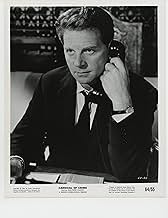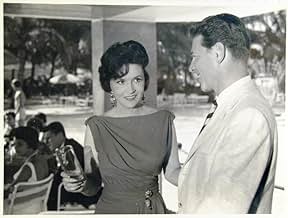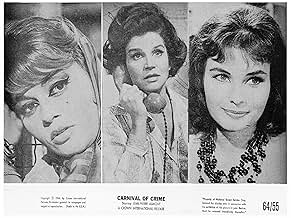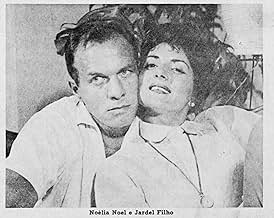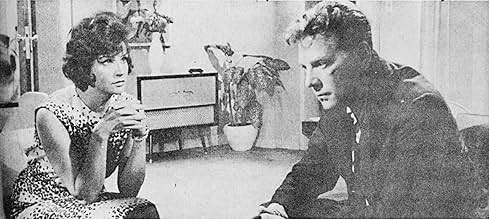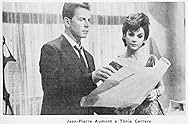Füge eine Handlung in deiner Sprache hinzuA four-alarm murder mystery, this nerve-tingling story is about a dashing, prominent builder in Brazil who is mistakenly accused of killing his wife, but because of it learns the truth about... Alles lesenA four-alarm murder mystery, this nerve-tingling story is about a dashing, prominent builder in Brazil who is mistakenly accused of killing his wife, but because of it learns the truth about the woman he thought he knew.A four-alarm murder mystery, this nerve-tingling story is about a dashing, prominent builder in Brazil who is mistakenly accused of killing his wife, but because of it learns the truth about the woman he thought he knew.
- Regie
- Drehbuch
- Hauptbesetzung
Norma Bengell
- Model
- (as Norma Benguell)
Empfohlene Bewertungen
This incoherent thriller has a story which surrounds an architect whose wife is murdered, meaning he is the chief suspect. Its seriously forgettable stuff with little in the way of energy or imagination. It was in fact an early release from b-movie distributers Crown International Pictures but this one was from a period before they started to get any good at this game. It is a very sub-par and tedious production indeed, which seemingly was based on a novel by Winston Graham, who wrote the very good Marnie which of course was adapted by Alfred Hitchcock into an equally excellent movie. Needless to say, Carnival of Crime isn't even in the same ball-park. It's only plus points truthfully come from its exotic Brazil location work.
It's odd to find fault with the fact that the full 91-minute version of this movie has been released on DVD instead of the cut-down 83-minute U.S. theatrical print, but this movie is the exception that proves the rule. The extra 8 minutes in the Brazilian version released in 1962 under the title Socia de alcoba, has nothing to do with the movie whatever. It's a completely extraneous episode in which two killers talk endlessly as they stalk their prey in the jungle. Not that this murder mystery is all that exciting in the original, despite a great deal of lensing on actual Brazilian locations. True, Jean-Pierre Aumont (who has the advantage of dubbing his English dialogue with his own distinctive voice) does his best to stir up a bit interest in the character's efforts to escape the police while he finds the real killer, but unfortunately he is stymied by a plot that takes forever and a century (particularly in the DVD version) to get under way and a total lack of talent in the directorial chair.
You get a bad feeling when the credits begin and the quality of the film is as poor as this one is; very dark and grainy. However, the credits prove to be the highlight of this stinker. The story is poorly written with a very weak plot. The acting itself isn't too bad but the actors have nothing to work with. In essence, the story involves a harried but brilliant architect who has won a contract for "Building 11" in the new capital of Brasilia. He is surrounded by a neglected and unfaithful wife, a female assistant who is after him, a drunken, lecherous colleague who fancies himself a ladies man, a pathetic mother-in-law and her gigolo, and a couple of enigmatic household employees. What plot there is involves our hero trying to get his building done on time, keeping track of his wife, and falling in love with his comely assistant. Dramatic developments and how they are dealt with round out the movie. The most remarkable feature of this film is a sequence of two undercover operatives or vigilantes stalking a Brazilian revolutionary in the jungle. The only possible connection this boring and poorly acted sequence has with the rest of the movie is the mention that this bad guy is upset because Brazil is spending millions to build a new city while people around it are starving. It is a bizarre and totally disconnected intrusion into the movie. The only redeeming feature of this disaster is the on location shots of the then under-construction city of Brasilia and of some location shots in Rio. These provide a nice time capsule of the new capital and the old in the early 60s. Maybe the best way to deal with the misfortune of having this DVD is to turn off the sound and just watch the 1960s Brazilian landscape.
In CARNIVAL OF CRIME, an architect (Jean-Pierre Aumont) takes a vacation with his beautiful, young assistant (Tonia Carrero), leaving his wife (Alix Talton) behind. When he returns, his wife is missing. Mystery ensues.
Sort of.
Unfortunately, a big chunk of time is gobbled up by a subplot involving two macho-mustache-wearing mercenaries, endlessly bickering in the Brazillian rain forest. These two men have absolutely nothing to do with the rest of the film. They're nothing more than one long, dull distraction!
Apparently on the trail of some revolutionary, they come across more like a pair from some failed 1970's cop show. They're way ahead of their time considering when this movie came out!
As if this unnecessary "bonus" footage wasn't brain-scalding enough, the other story about the missing wife -remember her?- is drowned in a hideous guitar soundtrack! At times, it's reminiscent of the primal twanging found in MESA OF LOST WOMEN!
The actual mystery just isn't that effective anyway, making it irrelevant whether whatshername is found or not.
Watch only if you enjoy the pain of "thrillers" without thrills of any kind...
Sort of.
Unfortunately, a big chunk of time is gobbled up by a subplot involving two macho-mustache-wearing mercenaries, endlessly bickering in the Brazillian rain forest. These two men have absolutely nothing to do with the rest of the film. They're nothing more than one long, dull distraction!
Apparently on the trail of some revolutionary, they come across more like a pair from some failed 1970's cop show. They're way ahead of their time considering when this movie came out!
As if this unnecessary "bonus" footage wasn't brain-scalding enough, the other story about the missing wife -remember her?- is drowned in a hideous guitar soundtrack! At times, it's reminiscent of the primal twanging found in MESA OF LOST WOMEN!
The actual mystery just isn't that effective anyway, making it irrelevant whether whatshername is found or not.
Watch only if you enjoy the pain of "thrillers" without thrills of any kind...
1961's "Carnival of Crime" (Socio de Alcova or Alcova Partner) was a dreary affair about dreary affairs in Rio de Janeiro, a coproduction between the US, Argentina, and Spain, its literary source 1956's "The Sleeping Partner," from popular author Winston Graham, best known for the series of historical Poldark stories set in Cornwall (his best known work was "Marnie," filmed by Alfred Hitchcock in 1964). One can easily identify it among the Crown International titles included in Gold Key's Scream Theater because of additional footage seemingly shot ten years later using the same actors from "They Saved Hitler's Brain," fortunately never seen again after the 20 minute mark. Even the shorter 83 minute print would have been a tough watch for even the heartiest of viewers, Jean Pierre Aumont as building entrepreneur Mike Voray, whose latest inspection lasts longer than he'd anticipated, returning home to an empty house and a letter from his missing wife saying that she's leaving him. The rest of the picture consists of his interminable search to find out where she is, every question repeated ad nauseum to people the couple knew, with even her mother unperturbed as she's preoccupied by her latest lover. This domestic drama should improve but doesn't at the hour long mark as her corpse is discovered in the trunk of her own car, Mike the obvious suspect though we know for sure he's not guilty. The climactic confession is delivered with a sadly dispassionate shrug, the titular carnival finally coming into play for a perfunctory chase without an ounce of excitement. Director George M. Cahan, a television veteran, didn't have to look far for his leading lady to play the deceased wife, Alix Talton from Universal's THE DEADLY MANTIS was actually his wife from 1950 until his death in 1991. As a follow up to Cahan's only other reprieve from steady television work, Mamie Van Doren's "The Blonde from Buenos Aires," he spent months of preparation in Rome casting his leading man, Richard Basehart and Stewart Granger bowing to Jean Pierre Aumont in the role of concerned husband, filming completed in March 1961 but only picked up by Crown International Pictures two years later. The ads publicized 'the splendor of Brasilia, the world's most modern capital!' and 'hear the beat of the Bossanova as played by Luiz Bonfa,' the main tagline screaming 'at the height of wild, frenzied, sensual pleasures...a murderer strikes and terror grips the city!!!' with the figure of a bound and gagged young woman being placed in the trunk of a car (definitely NOT a case for truth in advertising). CIP president Newton P. Jacobs outlined their highest promotional budget for its theatrical double bill with "Escape from Hell Island" in the spring of 1965, and one shudders at the thought of some unwary viewer with a strong attention span not only purchasing a ticket but actually sitting through both films! Lacking even the camp value of better known Crown entries, this one earns few friends among bad movie buffs and fully deserves its near total obscurity.
Wusstest du schon
- WissenswertesAlicia Bonet's debut.
- VerbindungenReferenced in The Crown Jewels: America's Oldest Indie Film Company (2016)
Top-Auswahl
Melde dich zum Bewerten an und greife auf die Watchlist für personalisierte Empfehlungen zu.
Details
- Erscheinungsdatum
- Herkunftsländer
- Sprachen
- Auch bekannt als
- Carnival of Crime
- Drehorte
- Produktionsfirmen
- Weitere beteiligte Unternehmen bei IMDbPro anzeigen
- Laufzeit1 Stunde 30 Minuten
- Farbe
- Sound-Mix
- Seitenverhältnis
- 1.37 : 1
Zu dieser Seite beitragen
Bearbeitung vorschlagen oder fehlenden Inhalt hinzufügen

Oberste Lücke
By what name was Sócio de Alcova (1962) officially released in India in English?
Antwort
